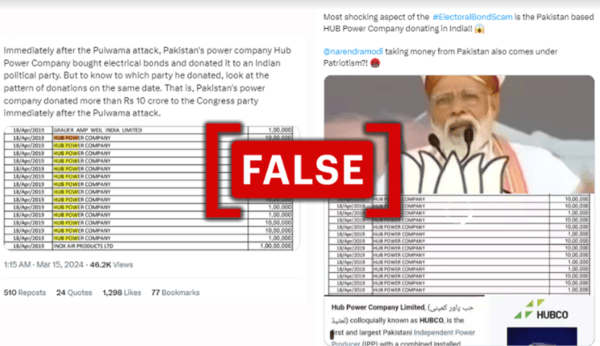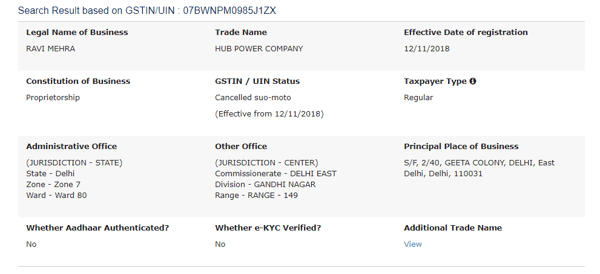By: rajini kg
ankita kulkarni
March 18 2024
Electoral bonds misinformation debunked: From 'Pak funding' myths to politicians twisting data
.png)
From incorrect data to a false 'Pakistani' link to the electoral bond donations, Logically Facts debunks major claims shared online. (Source: X/Facebook/Modified by Logically Facts)
Weeks before the 2024 Lok Sabha elections in India, the Supreme Court deemed the controversial electoral bond scheme unconstitutional, mandating the State Bank of India (SBI) to unveil the specifics of donations made to political parties via these bonds between April 12, 2019, to March 6, 2024. The SBI compiled and presented the data to the Election Commission of India (ECI), which subsequently published the data on its website.
The disclosure of electoral bond data comes at a crucial time, as the BJP (Bharatiya Janata Party) seeks a third consecutive term in power. The Opposition, particularly the Communist Party of India (Marxist), which had also petitioned the court, criticizes the scheme for its lack of transparency, suggesting it could facilitate the illicit flow of funds into the banking system.
Amid heightened scrutiny of political funding through electoral bonds — particularly concerning the ruling party, which has significantly benefited from the scheme — misinformation around it is rapidly spreading on social media. This includes false assertions about the origins of the donations and incorrect figures quoted by politicians.
Logically Facts has debunked two of these widespread claims.
Home Minister Amit Shah cites incorrect figures
During an interview with India Today, following the release of data on electoral bonds data, Home Minister Amit Shah was questioned about allegations that companies under investigation by the Enforcement Directorate (ED) or the Income Tax Department had purchased electoral bonds. Shah defended the scheme but inaccurately stated, “The Bharatiya Janata Party received electoral bonds worth approximately Rs 6,000 crore. The total bonds issued are Rs 20,000 crore. So, where did the remaining Rs 14,000 crore worth of bonds go?”
Moreover, Shah's allocation of electoral bond receipts to other parties was incorrect. He claimed that the Trinamool Congress received Rs 1,600 crore, the Indian National Congress Rs 1,400 crore, Bharatiya Rashtra Samithi Rs 1,200 crore, Biju Janata Dal Rs 775 crore, and the Dravida Munnetra Kazhagam Rs 639 crore through electoral bonds.
BJP's RP Singh quoted these same figures in his statement to the media regarding the data.
However, despite Shah’s claims, data from the Election Commission, incorporating information from 30 phases of bond issuance — of which only the initial 25 phases were available through party audit forms by March 14—tells a different story.
A collaborative investigation by Newslaundry, Scroll, and The News Minute under ‘Project Electoral Bond’ reports that Rs 16,492 crore worth of bonds were redeemed by 25 political parties between March 1, 2018, and January 2024, with the BJP receiving Rs 8,252 crores, not the Rs 6,000 crore Shah stated.
The report further states that the Indian National Congress received Rs 1,952 crore, the Trinamool Congress obtained Rs 1,705 crore, Bharatiya Rashtra Samithi Rs 1,408 crore, Biju Janata Dal Rs 1,020 crore, and the Dravida Munnetra Kazhagam secured Rs 677 crore, figures that vary from the ones cited by Shah.
The consortium has reported that while the data on how much money political parties have received is complete, the data of who purchased bonds worth Rs 4,002 crore (between March 1, 2018, and April 12, 2019) has not been disclosed.
A false ‘Pakistan’ link
Another widely shared claim on social media asserts that a company called 'HUB Power Company,' purportedly a Pakistan-based entity, purchased electoral bonds worth approximately Rs 95 lakh in April 2019, just after the 2019 Pulwama attack. Some posts suggested the funds were directed to the Congress party, while others indicated they went to the BJP.
 A screenshot of the viral post. (Source: X/Modified by Logically Facts)
A screenshot of the viral post. (Source: X/Modified by Logically Facts)
However, these claims are incorrect. A 2018 press note from the Department of Economic Affairs stated that only Indian citizens or entities incorporated in India are eligible to purchase electoral bonds. It is important to note that foreign companies can buy electoral bonds through their Indian entities.
Anjali Bharadwaj, co-convenor of Satark Nagrik Sangathan, a group advocating for transparency and accountability in governance, told Logically Facts that a 2016 amendment to the Foreign Contribution Regulation Act (FCRA) allows foreign companies registered in India to acquire electoral bonds through their Indian subsidiaries.
HUBCO (Power HUB Company Limited), an Independent Power Producer (IPP) based in Pakistan, clarified its position in a social media post, emphasizing its lack of affiliation with the electoral bonds controversy in India. The statement read, “HUBCO is being mistakenly identified as and connected to the recent inquiry in India about electoral bonds, which includes an Indian company called ‘Hub Power Company.’"
It added, “We would like to categorically state that we are not affiliated with the company named in this matter or any other company based in India.”
A Google search for Hub Power Company in India directed us to a Delhi-based enterprise registered in 2018 as a proprietorship on the official Goods and Service Tax (GST) website. The company's listed business activity encompasses both wholesale and retail operations.

Screenshot of the Google search for Hub Power Company in India. (Source: GST website)
However, the ‘Project Electoral Bond’ investigation revealed that the company based in Delhi with the same name is a “fake company” and was not registered with the Union Corporate Ministry. The report included comments from a GST department official of the Delhi government, stating that the company had been "shut down" for being established with the intention of committing fraud. The official remarked, "It was discovered that the company did not engage in the business activities it claimed. Consequently, the department took suo motu action and revoked its registration."
The official further explained, "For the GST registration, only a photograph was provided without any supporting documents. Typically, Aadhaar and PAN card details are necessary for registration. However, fraudsters often manage to bypass these requirements."
SII's Rs 52 crore donation via 'electoral bonds'
Another viral post on social media claimed that the Pune-based vaccine manufacturer Serum Institute of India (SII) donated over Rs 50 crore to the BJP through electoral bonds. Multiple users shared a graphic listing company names, dates, and amounts allegedly sent to the BJP via "Prudent." This graphic implies that SII contributed Rs 505.2 million (Rs 50.25 crore) to the BJP.
Screenshots of the viral post claiming SII donated electoral bonds worth Rs. 52 crore to the BJP. (Source: X/Modified by Logically Facts)
However, Logically Facts determined that the graphic, originating from a Reuters report, illustrates funds transferred to the BJP by SII through an electoral trust, not electoral bonds. SII made its donation through the Prudent Electoral Trust. According to the Association for Democratic Reforms, electoral trusts are established by companies to distribute contributions from other companies and individuals to political parties.
These contributions, as mandated by the Election Commission of India's guidelines, are publicly accessible on its website. Unlike electoral bonds, which have been anonymous until now, the donor details via electoral trusts are transparent.
Why SC struck down the scheme
The electoral bond scheme, launched in 2017 by then-Finance Minister Arun Jaitley of the BJP, aimed to eliminate 'black money' from political donations and provide a transparent, straightforward method for individuals and companies in India to support political parties.
On February 15, a five-judge bench of the Supreme Court invalidated the electoral bond scheme, asserting that "information about funding to a political party is crucial for voters to effectively exercise their right to vote." The court further ruled that "the amendments allowing for the non-disclosure of political funding information violate the right to information under Article 19(1)(a)" and instructed the State Bank of India, the institution through which electoral bonds could be purchased, to release a list of donors and the amounts contributed.
For years, the Opposition has accused the government of using central probe agencies to pursue opposition leaders. A report in The Hindu highlighted that several companies that purchased substantial amounts of electoral bonds were under investigation by the Enforcement Directorate and the Income Tax Department. Notably, 'Lottery King' Santiago Martin, whose company Future Gaming and Hotel Services PR contributed Rs 1,368 crore through electoral bonds, topped the donor list.
While detailed information on which party received how much from which donor remains undisclosed, the Supreme Court's decision has provided opposition parties with evidence to challenge the BJP's assertion of eradicating black money from the political landscape. This claim was a significant factor in the BJP's rise to power with a strong majority, following the anti-corruption movement in India against the then Congress-led government in 2013-14.
(Note: This article has been updated to add the claims regarding donations to the BJP by the Serum Institute of India.)


